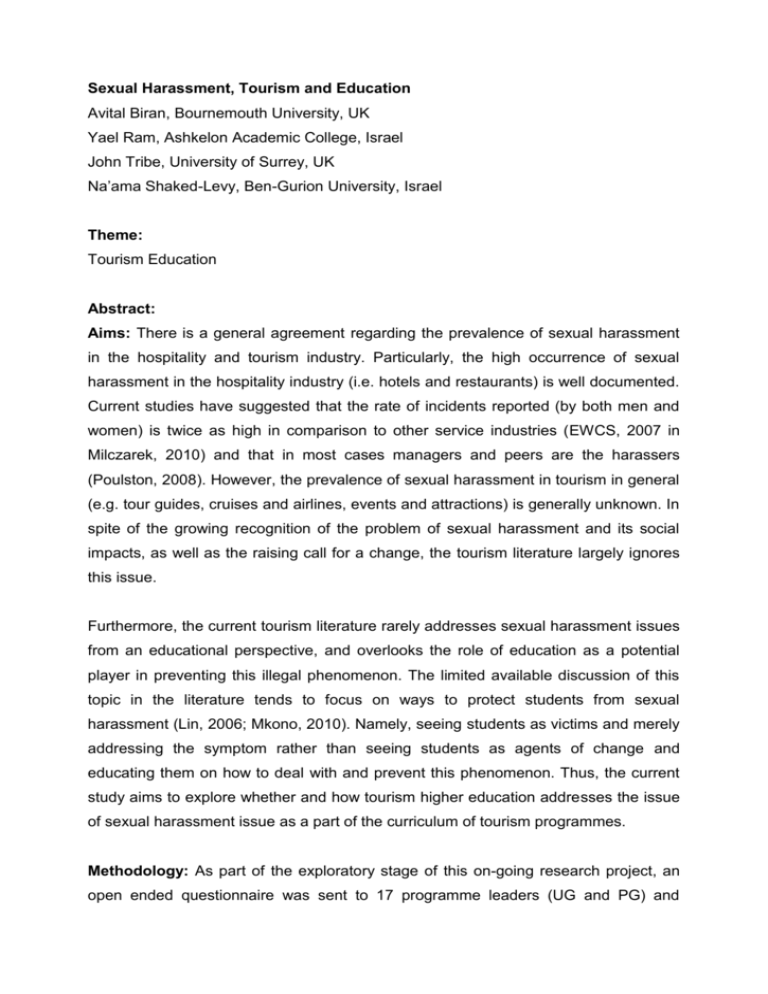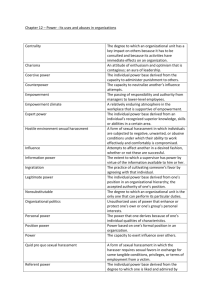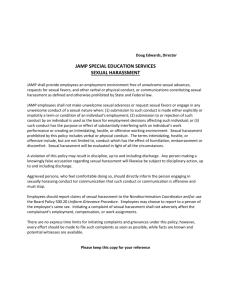
Sexual Harassment, Tourism and Education
Avital Biran, Bournemouth University, UK
Yael Ram, Ashkelon Academic College, Israel
John Tribe, University of Surrey, UK
Na’ama Shaked-Levy, Ben-Gurion University, Israel
Theme:
Tourism Education
Abstract:
Aims: There is a general agreement regarding the prevalence of sexual harassment
in the hospitality and tourism industry. Particularly, the high occurrence of sexual
harassment in the hospitality industry (i.e. hotels and restaurants) is well documented.
Current studies have suggested that the rate of incidents reported (by both men and
women) is twice as high in comparison to other service industries (EWCS, 2007 in
Milczarek, 2010) and that in most cases managers and peers are the harassers
(Poulston, 2008). However, the prevalence of sexual harassment in tourism in general
(e.g. tour guides, cruises and airlines, events and attractions) is generally unknown. In
spite of the growing recognition of the problem of sexual harassment and its social
impacts, as well as the raising call for a change, the tourism literature largely ignores
this issue.
Furthermore, the current tourism literature rarely addresses sexual harassment issues
from an educational perspective, and overlooks the role of education as a potential
player in preventing this illegal phenomenon. The limited available discussion of this
topic in the literature tends to focus on ways to protect students from sexual
harassment (Lin, 2006; Mkono, 2010). Namely, seeing students as victims and merely
addressing the symptom rather than seeing students as agents of change and
educating them on how to deal with and prevent this phenomenon. Thus, the current
study aims to explore whether and how tourism higher education addresses the issue
of sexual harassment issue as a part of the curriculum of tourism programmes.
Methodology: As part of the exploratory stage of this on-going research project, an
open ended questionnaire was sent to 17 programme leaders (UG and PG) and
senior faculty members from eight countries (amongst this, UK, Israel, Brazil,
Malaysia,
and Germany). In order to minimize potential bias the questionnaire
referred to “sex related issues in the context of tourism and hospitality higher
education” in general, and focused on programmes and themes regarding sex,
tourism, ethics and sexual harassment. Specifically, the questionnaire included
questions aiming to reveal how such issues are addressed considering the future role
of students as employees and managers in this industry, rather than tourists only. The
responses for the questionnaire were analysed in order to find key themes and topics.
Findings and key arguments: The main finding of the exploratory study is that
tourism higher education curriculum generally overlooks the issue of sexual
harassment. Thus, the programmes do not refer to students as possible victims or as
agents for social change. Furthermore, the findings indicate that tourism higher
education programmes address sex related issue in the context of tourist experiences
and host community impacts, yet overlooks sexual related issue in the tourism work
environment. These findings, however limited and preliminary, call for shifting the
focus of the higher education, from discussing sex related issues only with regard to
the local community and the tourists to considering those people working in the
industry. Furthermore, the current study highlights the role of higher education in
generating social change, by means of raising awareness, providing tools for students
and building the ethical foundations for responsible management.
References:
Lin, Y. H. (2006). The incidence of sexual harassment of students while undergoing
practicum training experience in the Taiwanese hospitality industry—individuals
reactions and relationships to perpetrators. Tourism Management, 27, 51- 68.
Milczarek, M. (2010). Workplace violence harassment: A European picture. European
Agency for Safety and Health at Work, EU-OSHA
Mkono, M. (2010). Zimbabwean hospitality students’ experiences of sexual
harassment in the hotel industry. International Journal of Hospitality Management, 29,
729- 735.
Poulston, J. (2008). Metamorphosis in hospitality: A tradition of sexual harassment.
International Journal of Hospitality Management, 27, 232-240.









